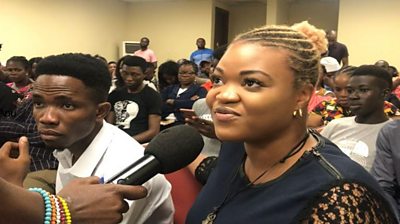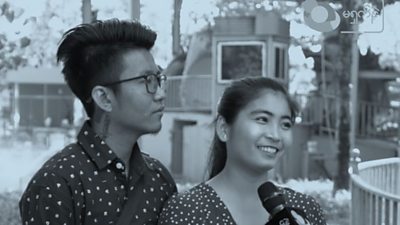Downloads
As part of the European Union Support to Democratic Governance in Nigeria (EU SDGN) Programme, Â鶹ԼÅÄ Media Action aimed to increase young people’s knowledge and understanding of key electoral issues, to strengthen their political participation and to achieve more informed public discussion. Research showed that regular followers of our social media platforms where project content was shared were more likely to know of their rights and responsibilities, discuss political issues of relevance and participate in political activities.
Context
Nigeria has high media penetration, and nearly everyone has access to one form of media or another. Data Reportal notes that there were 33 million social media users in Nigeria in January 2021. Figures vary, but it is thought that over 16 million people in Nigeria are regularly using Facebook, and around 3.5 million are regularly using Instagram. Twitter, WhatsApp and YouTube are also popular platforms.
The years since the 2015 Nigerian elections left a sense of disappointment in the government and the political process for Nigerians, especially young people.
Recognising this, the project aimed at strengthening the participation of young women and men in political processes pre and post the 2019 national elections. Â鶹ԼÅÄ Media Action research carried out in 2016 showed that young men and women from both urban and rural areas named the internet and social media as a preferred source of information on governance topics.
The project
The European Union Support to Democratic Governance in Nigeria project employed a ‘social media first’ approach to strengthen the political knowledge, understanding, discussion and efficacy of young (18-24 years) women and men across all 36 states and Federal Capital Territory (FCT) in Nigeria. High-impact social media content in the form of infographics, short factual films, still photographs, short drama skits and Public Service Announcements were produced and posted under the EU governance programme (and MI-VotE project) across our Â鶹ԼÅÄ Media Action Arewa (Hausa) and Naija (English) Facebook and Instagram platforms to share balanced information on electoral and political processes, role model political participation, and engage young Nigerians in social issues that matter to them. The project also strengthened the capacity of media organisations across Nigeria to provide more trusted, accurate and balanced social media content that meets audience needs.
Research methodology
Qualitative and quantitative research was conducted to evaluate the impact of the project. Six group discussions with audiences, town hall meeting attendants and interviews with eight experts and trainee journalists, and an endline mobile survey with a sample of 2,846 young adults (between the age of 18 and 27) were conducted across the thirty six states and FCT to examine the links between exposure to our social media content and citizens’ engagement in political, electoral and governance processes pre and post-2019 elections in Nigeria.
Key findings
- Â鶹ԼÅÄ Media Action social media content reached 27% of young people aged 18 – 27 years across the 36 states and FCT. Those reached were more men (62%), more of those within the 21 to 24 year age group (46%) and more of those with secondary or higher education (55%).
- Regular followers appreciated its informative and entertaining content. They liked the pages for discussing political issues in a jovial way and described the content as trendy, appealing and suitable for young people, increasing their interest in governance related issues.
- Regular followers are more knowledgeable about their rights and responsibilities as citizens. Regression analysis showed that, when controlling for other factors, regular followers of our social media content were more likely to know their rights, including their political rights and responsibilities than non-regular followers.
- Those regularly exposed to our social media content are more vocal about their rights and responsibilities as citizens. Regression analysis showed that, when controlling for other factors, regular followers of EU governance programme social media content or similar on our pages were 1.5 times as likely to have frequently discussed political or electoral issues of relevance offline or online with family, friends or others compared with those not regularly exposed.
- Those regularly exposed to our social media pages are more engaged in political activities. Regression analysis showed that, when controlling for other factors, those who were regularly exposed to EU governance programme and similar content on our pages were nearly 4 times as likely to be politically active in the last 12 months i.e. they have participated in at least one form of political activity compared with those who were not regularly exposed.
- Our social media content was also found by some young audiences to have addressed apathy. Those regularly exposed to EU governance programme and similar social media content on our pages were 1.7 times as likely to have voted in the last 2019 elections compared with those who were not regularly exposed, however they were neither more nor less likely to say they will vote in next 2023 elections compared with those who were not regularly exposed.
- Journalists reported that the training provided by Â鶹ԼÅÄ Media Action to partner stations has improved their capacity to produce and distribute relevant and engaging social media content addressing electoral issues, which in turn has improved the quality of their outputs.
Implications
The research findings show that social media can be an effective platform for improving levels of knowledge, discussion and political participation among young people.
Overall, Â鶹ԼÅÄ Media Action social media content in Nigeria has contributed to positive outcomes around knowledge, discussion and behaviour among its regular audiences.
The study found that regular followers of our social media content were neither more nor less likely to vote in the 2023 elections. Therefore, the importance of continued civic and voter education pre and post elections cannot be underemphasised. In qualitative research young audiences said ‘not seeing a point in voting’, ‘lack of trust in the system’ and ‘lack of interest in political processes’ were some of their reasons for not planning to vote.
In future projects, we recommend considering how to engage with young people who are disengaged from the political system.
Learn more about our work in Nigeria here.
Read more on the impact of our work through social media
Our research library
-
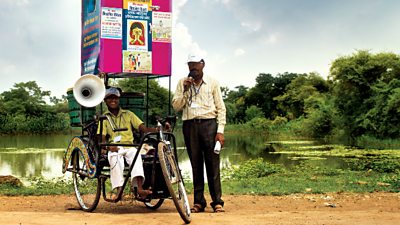
Long reads
Read our comprehensive research reports of the evidence behind our work. All of our publications are freely available to download. -
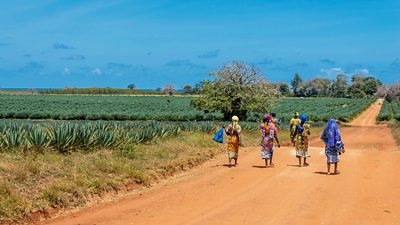
Short reads
At a glance, explore key findings and evidence behind our work. All of our publications are freely available to download. -

By country
Explore our findings and analysis country by country. All of our publications are freely available to download. -
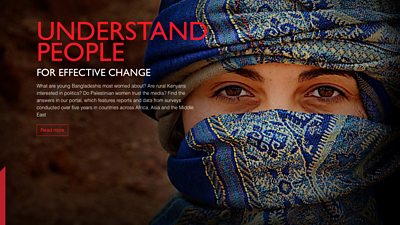 What are young Bangladeshi's most worried about? Are rural Kenyans interested in politics? Do Palestinian women trust the media? Find the answers in our data portal (last updated 2020).
What are young Bangladeshi's most worried about? Are rural Kenyans interested in politics? Do Palestinian women trust the media? Find the answers in our data portal (last updated 2020).
